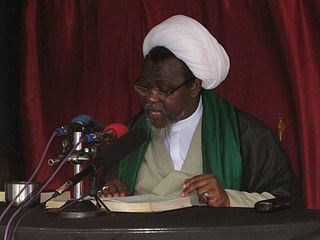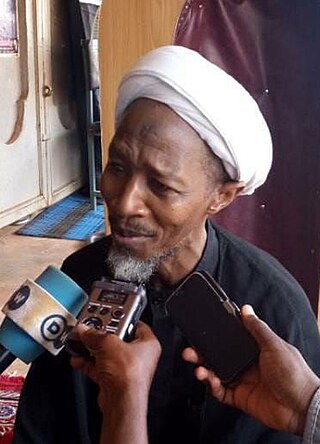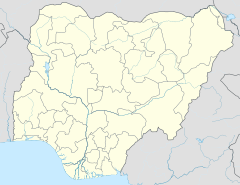
A human shield is a non-combatant who either volunteers or is forced to shield a legitimate military target in order to deter the enemy from attacking it.

The Lebanese Civil War was a multifaceted armed conflict that took place from 1975 to 1990. It resulted in an estimated 150,000 fatalities and led to the exodus of almost one million people from Lebanon.

The Islamic Human Rights Commission (IHRC) is a non-profit organisation based in London. Its stated mission is to "champion the rights & duties revealed for human beings" and to "promote a new social [and] international order, based on truth, justice, righteousness [and] generosity, rather than selfish interest." The group was established in 1997. The organisation, since 2007, has held consultative status with the United Nations Department of Economic and Social Affairs.

The Cave of the Patriarchs massacre, also known as the Ibrahimi Mosque massacre or the Hebron massacre, was a mass shooting carried out by Baruch Goldstein, an American-Israeli physician and extremist of the far-right ultra-Zionist Kach movement. On 25 February 1994, during the Jewish holiday of Purim, which had overlapped in that year with the Islamic holy month of Ramadan, Goldstein, dressed in Israeli army uniform, opened fire with an assault rifle on a large gathering of Palestinian Muslims praying in the Ibrahimi Mosque in Hebron. He killed 29 people, including children as young as 12, and wounded 125 others. Goldstein was overpowered and beaten to death by survivors.

Kaduna is a state in the northwest geopolitical zone of Nigeria. The state capital is its namesake, the city of Kaduna, which was the 8th largest city in the country as of 2006. Created in 1967 as North-Central State, which also encompassed the modern Katsina State, Kaduna State achieved its current borders in 1987. Kaduna State is the fourth largest and third most populous state in the country, Kaduna State is nicknamed the Centre of Learning, owing to the presence of numerous educational institutions of importance within the state such as Ahmadu Bello University, Nigerian Defence Academy, Air Force Institute of Technology (AFIT), Kaduna Polytechnic, etc.

Zaria is a metropolitan city in Nigeria, located at present time within four local government areas in Kaduna State. It serves as the capital of the Zazzau Emirate Council and is one of the original seven Hausa city-states. The local government areas comprising Zaria are Zaria, Sabon Gari, Giwa, and Soba local government areas of Kaduna State, Nigeria.
Although the majority of the Nigerian Muslim population is Sunni, there is a small Shia minority, particularly in the northern states of Kano and Sokoto. However, there are no actual statistics that reflect a Shia population in Nigeria, and a figure of even 5% of the total Nigerian Muslim population is thought to be too high “because of the routine conflation of Shi’a with Sunnis who express solidarity with the Iranian revolutionary program, such as those of Zakzaky’s Ikhwani.”
The Islamic Movement of Nigeria is a banned Shia religious organization which aims to establish an Islamic state in Nigeria. It was founded by Ibrahim Zakzaky, who was inspired by the Iranian Revolution and rejects the authority of the Nigerian Government. The movement focuses on a nonviolent approach toward achieving an Islamic State, which has established some legitimacy as an alternative government. The IMN is headquartered at the spiritual center, Husainiyya Baqiyatullah, in Zaria with the group's numbers estimated around 5% of Nigeria's Muslim population of 100 million. While the main focus of the group is Islamic studies and enlightenment, Zakzaky has also encouraged his followers to pursue Western education and engage in charity work. Currently, the leader of the movement, Zakzaky, was in jail recently, and the group organized protests for his release that have resulted in conflict with the Government.

Ibraheem Yaqoub El-Zakzaky is a Nigerian religious leader. An outspoken and prominent Shi'a leader in Nigeria, he has been imprisoned several times for what he sees as injustice, especially the system of corruption in his country. Zakzaky claims that only Islam can offer solution to the complex socio-political problems facing Nigeria, which has over the years stagnated the country's development. In a lecture he has delivered in marking the occasion of Sheikh Uthman Bn Fodio Week organized by the Academic Forum of Islamic Movement, Zakzaky stated that he is continuing the Jihad of Uthman Bn Fodio to make sure that Islam becomes the ruling religion in not only Nigeria but the entirety of West Africa. In a lecture he delivered on the same occasion in Sokoko, one of his proponents, Dr. Nasir Hashim has claimed that Zakzaky’s dream is the only hope for Africa.
Shia Islam in Africa is the continent's second most widely professed sect of Islam behind Sunni Islam.
Nakba Day in 2011 was the annual day of commemoration for the Palestinian people marking the Nakba—the displacement that accompanied the creation of Israel in 1948. Generally held on May 15, commemorative events in 2011 began on May 10, in the form of march by Palestinian Arab citizens of Israel on Israel's Independence Day. On May 13, clashes between stone-throwing youths and Israeli security forces in East Jerusalem resulted in one Palestinian fatality, and clashes continued there and in parts of the West Bank in the days following.

Anti-Shi'ism is hatred of, prejudice against, discrimination against, persecution of, and violence against Shia Muslims because of their religious beliefs, traditions, and cultural heritage. The term was first used by Shia Rights Watch in 2011, but it has been used in informal research and written in scholarly articles for decades.

Reactions to the 2014 Gaza War came from around the world.
The Zaria massacre, also known as the Buhari massacre, was a massacre carried out by the Nigerian Army in Zaria, Kaduna State, Nigeria, on Saturday, 12 December 2015, against Shia Muslims, mostly members of the Islamic Movement in Nigeria (IMN). At least 1000 civilians were killed, with 347 bodies secretly buried by the Army in a mass grave.
The following lists events that happened during 2016 in Nigeria.

Qasim Umar Sokoto was a contributor to the Islamic Movement of Nigeria, the prayer leader and Islamic teacher in Sokoto, the Northern city of Nigeria.
The Syrian Desert campaign was a campaign waged by the Syrian Arab Armed Forces forces and their allies, including Iran and Russia, against the remaining forces of the Islamic State in the Syrian Desert region.

On the night of 20 October 2020, at about 6:50 p.m., members of the Nigerian Army opened fire on unarmed End SARS protesters at the Lekki toll gate in Lagos State, Nigeria. Amnesty International stated that at least 12 protesters were killed during the shooting. A day after the incident, on 21 October, the governor of Lagos State, Babajide Sanwo-olu, denied reports of any loss of lives, but later admitted in an interview with a CNN journalist that "only two persons were killed".











